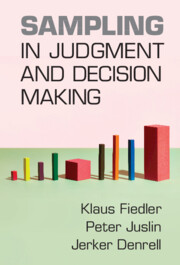Book contents
- Sampling in Judgment and Decision Making
- Sampling in Judgment and Decision Making
- Copyright page
- Contents
- Figures
- Tables
- Contributors
- Part I Historical Review of Sampling Perspectives and Major Paradigms
- Part II Sampling Mechanisms
- Part III Consequences of Selective Sampling
- Part IV Truncation and Stopping Rules
- Chapter 13 Sequential Decisions from Sampling:
- Chapter 14 Thurstonian Uncertainty in Self-Determined Judgment and Decision Making
- Chapter 15 The Information Cost–Benefit Trade-Off as a Sampling Problem in Information Search
- Part V Sampling as a Tool in Social Environments
- Part VI Computational Approaches
- Index
- References
Chapter 15 - The Information Cost–Benefit Trade-Off as a Sampling Problem in Information Search
from Part IV - Truncation and Stopping Rules
Published online by Cambridge University Press: 01 June 2023
- Sampling in Judgment and Decision Making
- Sampling in Judgment and Decision Making
- Copyright page
- Contents
- Figures
- Tables
- Contributors
- Part I Historical Review of Sampling Perspectives and Major Paradigms
- Part II Sampling Mechanisms
- Part III Consequences of Selective Sampling
- Part IV Truncation and Stopping Rules
- Chapter 13 Sequential Decisions from Sampling:
- Chapter 14 Thurstonian Uncertainty in Self-Determined Judgment and Decision Making
- Chapter 15 The Information Cost–Benefit Trade-Off as a Sampling Problem in Information Search
- Part V Sampling as a Tool in Social Environments
- Part VI Computational Approaches
- Index
- References
Summary
Information amount is a crucial determinant of decision outcomes. But how much information one should collect before arriving at a decision depends on a cost–benefit trade-off: Is the expected benefit of increased decision accuracy that can be gained from additional information higher than the additional information costs? To investigate this trade-off with temporal costs for information, we developed a speed–accuracy trade-off paradigm with sample-based decisions, in which the total payoff was the product of the average payoff per decision and the number of decisions completed in a restricted period. Increasing n served to increase the accuracy of choices, but also to decrease the number of completed choices. Yet, whereas the number of completed choices decreases linearly with increasing n, accuracy increases in a clearly sublinear fashion. As a consequence, the sample-based choice task calls for more weight given to speed than to accuracy. However, overly conservative sampling strategies prevented almost all participants from exploiting the speed advantage despite various guiding interventions. Even when the task was enriched by the social aspect of a teammate or rival, who demonstrated the optimal trade-off, participants remained too focussed on accuracy. We also investigate the cost–benefit trade-off with financial information costs, for which participants’ performance was less biased. We propose this to be related to how evaluable the information’s costs were relative to its benefits. Issues of adaptivity in contrast with optimality are addressed in a final discussion.
Keywords
- Type
- Chapter
- Information
- Sampling in Judgment and Decision Making , pp. 334 - 356Publisher: Cambridge University PressPrint publication year: 2023

